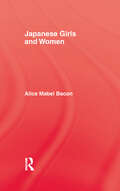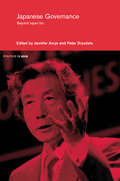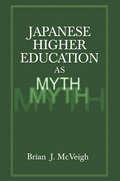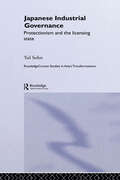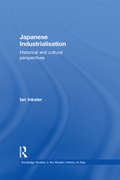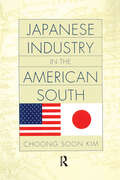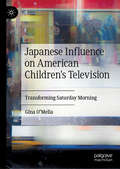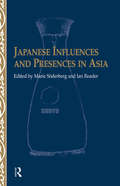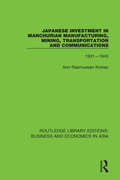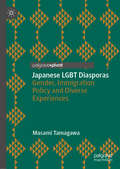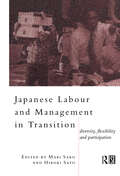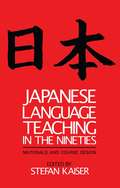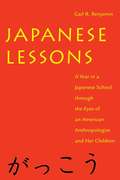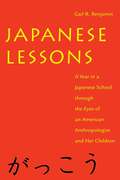- Table View
- List View
Japanese Feminist Debates: A Century of Contention on Sex, Love, and Labor
by Ayako KanoRecent years have seen a surge of interest in Japanese feminism and gender history. This new volume brings to light Japan's feminist public sphere, a discursive space in which academic, journalistic, and political voices have long met and sparred over issues that remain controversial to the present day: prostitution, pornography, reproductive rights, the balance between motherhood and paid work, relationships between individual, family, and state. <p><p>Japanese Feminist Debates: A Century of Contention on Sex, Love, and Labor contributes to this discussion in a number of unique ways.
Japanese Film Festivals in the Asia-Pacific: Cultural Diplomacy, Practices and Audiences (Framing Film Festivals)
by Teck Fann GohThis book represents the first in-depth research dedicated to examining the historical and contemporary developments of Japanese film festivals as sites of cultural diplomacy. It focuses on the proliferation, network and operation of Japanese Film Festivals (JFFs) in the Asia-Pacific from the late 1970s until 2020. Through case examples in Australia, Malaysia and Thailand, the book explores how the formation and recent developments of JFFs in the region reflect wider changes in the function of Japanese cultural diplomacy through films, particularly with the intensification of economic, cultural and diplomatic opportunities presented in this geopolitical space.
Japanese Film and the Challenge of Video (Media, Culture and Social Change in Asia)
by Tom MesThis book explores the phenomenon of V-Cinema, founded in Japan in 1989 as a distribution system for direct-to-video movies which film companies began making having failed to recoup their investment in big budget films. It examines how studios and directors worked quickly to capitalize on niche markets or upcoming and current trends, and how as a result this period of history in Japanese cinema was an exceptionally diverse and vibrant film scene. It highlights how, although the V-Cinema industry declined from around 1995, the explosion in quantity and variety of such movies established and cemented many specific genres of Japanese film. Importantly the book argues that film scholars who have long looked down on video as a substandard medium without scholarly interest have been wrong to do so, and that V-Cinema challenges accepted notions of cultural value, providing insight into the formation of cinematic canons and inviting us to rethink what is meant by "Japanese cinema".
Japanese Filmmakers in the Wake of Fukushima: Perspectives on Nuclear Disasters (Critical Asian Cinemas)
by Mitsuyo Wada-MarcianoIn the ongoing aftermath of the nuclear accident in 2011, filmmakers have continued to issue warnings about the state of Japanese society and politics, which remain mired in refusal to change. Nearly a decade in the making, Japanese Filmmakers in the Wake of Fukushima is based on in-person interviews with countless filmmakers, as well as continuous dialogue with them and their work. Author Wada-Marciano has expanded these dialogues to include students, audiences at screenings, critics, and researchers, and her observations are based on down-to-earth-exchange of ideas engaged in over a long period of time. Filmmakers and artists are in the vanguard of those who grapple with what should be done regarding the struggle against fear of the invisible blight—radiation exposure. Rather than blindly following the mass media and public opinion, they have chosen to think and act independently. While repeatedly viewing and reviewing the film works from the post-Fukushima period, Wada-Marciano felt the unwavering message that emanates from them: There must be no more nuclear weapons. There must be no more nuclear power generation. The book is dedicated to convincing readers of the clarity of their message.
Japanese Flower Culture – An Introduction
by Kaeko ChibaThis book provides a comprehensive introduction to ikebana and other forms of Japanese flower culture. Unlike other books on the subject which focus on practice, the book provides both an academic discussion of the subject and an introduction to practice. It examines ikebana and flower culture from anthropological and sociological perspectives, analyses Japanese aesthetics, customs and rituals related to flower arrangements, and outlines ikebana history and the Grand Master Iemoto system. It considers how the traditional arts are taught in Japan, and links traditional arts to current issues in today’s society, such as gender and class. This book also covers how to prepare ikebana utensils, preserve flowers and branches, and how to appreciate arrangements, placing an emphasis on acknowledging our five senses throughout each stage of the process. The book will be of interest to a wide range of people interested in Japanese flower culture – university professors and students, tourists and people interested in traditional Japanese arts.
Japanese Girls
by BaconFirst published in 2001. Routledge is an imprint of Taylor & Francis, an informa company.
Japanese Governance: Beyond Japan Inc. (Politics in Asia)
by Peter Drysdale Jennifer AmyxJapan Inc was once used to describe the powerful political and economic system that delivers Japan's transformation to an industrial power. This book is about the breakdown and failure of policy coherence in Japan in the 1990s and how the political economy of Japan has changed in response. The essays in the volume seek to identify where change has occurred, as well as where things have not changed and why. The issue of policymaking transparency is accorded particular attention.The book covers a wide range of Japanese institutions and policy areas, including the political party system, electoral and legal reforms, deliberation councils and the financial and agricultural sectors. The findings suggest that resistance to change through the political system is at the root of Japan's inability to deal with its national policy problems. Nonetheless, there has been considerable reform and change towards more open economic and political competition. And, these changes profoundly affect the way in which foreign governments must now relate to domestic political processes in their dealings with Japan.This interdisciplinary book draws together contributions from experts in political science, economics, law and Japanese studies to give a deeper understanding of how Japan's political economy and policymaking processes are working today.
Japanese Higher Education as Myth
by Brian J. McVeighIn this dismantling of the myth of Japanese "quality education", McVeigh investigates the consequences of what happens when statistical and corporatist forces monopolize the purpose of schooling and the boundary between education and employment is blurred.
Japanese Homes & Their Surround (Dover Architecture Ser.)
by MorseFirst Published in 2005. Routledge is an imprint of Taylor & Francis, an informa company.
Japanese Horror Films and their American Remakes: Japanese Horror Films And Their American Remakes (Routledge Advances in Film Studies)
by Valerie WeeThe Ring (2002)—Hollywood’s remake of the Japanese cult success Ringu (1998)—marked the beginning of a significant trend in the late 1990s and early 2000s of American adaptations of Asian horror films. This book explores this complex process of adaptation, paying particular attention to the various transformations that occur when texts cross cultural boundaries. Through close readings of a range of Japanese horror films and their Hollywood remakes, this study addresses the social, cultural, aesthetic and generic features of each national cinema’s approach to and representation of horror, within the subgenre of the ghost story, tracing convergences and divergences in the films’ narrative trajectories, aesthetic style, thematic focus and ideological content. In comparing contemporary Japanese horror films with their American adaptations, this book advances existing studies of both the Japanese and American cinematic traditions, by: illustrating the ways in which each tradition responds to developments in its social, cultural and ideological milieu; and, examining Japanese horror films and their American remakes through a lens that highlights cross-cultural exchange and bilateral influence. The book will be of interest to scholars of film, media, and cultural studies.
Japanese Industrial Governance: Protectionism and the Licensing State (Routledge Studies in Asia's Transformations #Vol. 1)
by Yul SohnThis book uses a wide range of original Japanese sources to trace important aspects of the history of Japanese economic ideas, in particular, the development of Japan's industrial policy. In contrast to most others who begin their story within the 1930s or after 1945, Sohn goes back to the Meiji era to trace the evolution of Japanese developmental debates, state policies and market strategies involving cartels and small enterprises, city and countryside, and approaches that variously emphasize the market and the role of the state as Japan seeks to position itself in the world and regional economies.
Japanese Industrialisation: Historical and Cultural Perspectives (Routledge Studies in the Modern History of Asia)
by Ian InksterJapan's escape from colonialism and its subsequent industrialisation has taken it to the point where its economy is second only to that of the US. This comprehensive volume examines how this rapid change of fortunes occurred, and the impact it has had on East Asia and the world at large. Taking a wide range and focus, Inkster looks at the history of Japan's industrial development in a social and cultural context.
Japanese Industry in the American South
by Choong Soon KimJapanese Industry in the American South is an anthropological case study that describes whole industrial cultures found in three Japanese industrial plants in the American South. This book searches for answers to these questions: Why are Japanese industries coming to the American South? To what extent does Japan industrial management in the American South replicate the industrial relations model used in the home plants in Japan? What are the reactions of Americans toward the Japanese expatriates? At the same time, the book looks at the profound impact that the Japanese have had on Southerners.
Japanese Influence on American Children's Television: Transforming Saturday Morning
by Gina O’MeliaJapanese Influence on American Children’s Television examines the gradual, yet dramatic, transformation of Saturday morning children’s programming from being rooted in American traditions and popular culture to reflecting Japanese popular culture. In this modern era of globalization and global media/cultural convergence, the book brings to light an often overlooked phenomenon of the gradual integration of narrative and character conventions borrowed from Japanese storytelling into American children’s media. The book begins with a brief history of Saturday morning in the United States from its earliest years, and the interaction between American and Japanese popular media during this time period. It then moves onto reviewing the dramatic shift that occurred within the Saturday morning block through both an overview of the transitional decades as well as an in-depth analysis of the transformative ascent of the shows Mighty Morphin Power Rangers, Pokémon, and Yu-Gi-Oh!.
Japanese Influences and Presences in Asia (Nias Studies In Asian Topics Ser. #No.25)
by Ian Reader Marie SoederbergWhile scholarly works on this topic have to date mainly concentrated on Japan's influences in economic and political terms, this volume examines Japanese influences in Asia from a broader perspective. The text takes into account human factors, such as the presence of Japanese people as workers, managers and visitors in Asian societies and the flow of Japanese goods in terms on their impact on popular culture. In addition, the book examines the feelings within other Asian nations such as India and Malaysia to the Japanese presence, looking at Japanese the people’s aspirations, expectations and at times disappointments. Written by Asian and Western scholars from variety of academic perspectives, the essays in this volume analyze the topic at both macro- and micro-levels. They examine the variegated and highly differing influences and presences of Japan as seen from a number of view points, from street perspectives and the world of popular culture, to global political issues, to questions of regional investment and the cultural and economic aspirations of Chinese students in Japan.
Japanese Inn
by Oliver StatlerThe history of Minaguchi-ya, a Japanese inn, from its unintentional inception in 1569 to a visit from the Emperor and Empress in 1957.
Japanese Investment in Manchurian Manufacturing, Mining, Transportation, and Communications, 1931-1945 (Routledge Library Editions: Business and Economics in Asia #21)
by Ann Rasmussen KinneyThis book, first published in 1982, closely examines the Japanese investment in the industries of its puppet state Manchuria in the years 1930 to 1945. Attention is paid to industrial capital by source and type, facilitating the analysis of the relationship between the different investment components on one hand, and economic and institutional factors on the other. The course of inflation is also traced and its relationship to industrial investment studied. The Manchurian experience throws light on the volume of capital available through inflationary processes, the point up to which inflationary financing can successfully be carried, and the institutional factors necessary to make such a policy effective in increasing real investment.
Japanese LGBT Diasporas: Gender, Immigration Policy and Diverse Experiences
by Masami TamagawaWith little existing scholarship on LGBT diaspora from Asia, this groundbreaking book examines the intersectionality of migration, sexuality, and gender, as well as race and ethnicity, through an analysis of the transnational experiences of Japanese LGBT diasporas in the USA, Canada and Australia. Employing a variety of methods, including a questionnaire, ethnographic analysis and case studies, the author demonstrates and analyses LGBT experiences where the notion of “gay-friendly” Japan prevails, looking at their reasons to flee the country and their diverse experiences in their host country. These include their needs and want for social services for Japanese LGBT diaspora. Findings are comparatively examined with LGBT refugees’ experiences, among LGBT subgroups, as well as across the three countries, highlighting the significance of gender, race and ethnicity, as well as immigration policy, in the experiences of LGBT diasporas from Japan. This book will appeal to students and scholars interested in Migration, Race and Ethnicity, Gender and Sexuality, and Asian Studies. Masami Tamagawa is Senior Teaching Professor of Japanese Studies, Gender Studies, and Asian Studies at Skidmore College, USA.
Japanese Labour and Management in Transition: Diversity, Flexibility and Participation
by Mari Sako Hiroki SatoJapanese Management and Labour in Transition explores the changing face of Japanese industrial relations. Part one of the work outlines recent trends in Japanese labour markets, labour law and corporate strategy, and explores the responses of both management and labour to pressure posed by these trends. Part two analyses the interaction between the state, management and labour, considering both the macro and the micro levels. This compilation of up-to-date research by leading Japanese scholars challenges the traditional view of 'lifetime' employment and focuses on the growing economic pressures that Japanese management and labour currently face.
Japanese Language Teaching in the Nineties: Materials and Course Design
by Stefan KaiserThe world-wide growth in demand for Japanese throughout the world has led to rapid developments in Japanese language teaching. This volume examines these developments and their implications for the future in a series of case studies.
Japanese Lessons: A Year in a Japanese School Through the Eyes of An American Anthropologist and Her Children
by Gail R. BenjaminGail R. Benjamin reaches beyond predictable images of authoritarian Japanese educators and automaton schoolchildren to show the advantages and disadvantages of a system remarkably different from the American one... --The New York Times Book Review Americans regard the Japanese educational system and the lives of Japanese children with a mixture of awe and indignance. We respect a system that produces higher literacy rates and superior math skills, but we reject the excesses of a system that leaves children with little free time and few outlets for creativity and self-expression. In Japanese Lessons, Gail R. Benjamin recounts her experiences as a American parent with two children in a Japanese elementary school. An anthropologist, Benjamin successfully weds the roles of observer and parent, illuminating the strengths of the Japanese system and suggesting ways in which Americans might learn from it. With an anthropologist's keen eye, Benjamin takes us through a full year in a Japanese public elementary school, bringing us into the classroom with its comforting structure, lively participation, varied teaching styles, and non-authoritarian teachers. We follow the children on class trips and Sports Days and through the rigors of summer vacation homework. We share the experiences of her young son and daughter as they react to Japanese schools, friends, and teachers. Through Benjamin we learn what it means to be a mother in Japan--how minute details, such as the way mothers prepare lunches for children, reflect cultural understandings of family and education. Table of Contents Acknowledgments 1. Getting Started 2. Why Study Japanese Education? 3. Day-to-Day Routines 4. Together at School, Together in Life 5. A Working Vacation and Special Events 6. The Three R's, Japanese Style 7. The Rest of the Day 8. Nagging, Preaching, and Discussions 9. Enlisting Mothers' Efforts 10. Education in Japanese Society 11. Themes and Suggestions 12. Sayonara Appendix. Reading and Writing in Japanese References Index
Japanese Lessons: A Year in a Japanese School Through the Eyes of An American Anthropologist and Her Children
by Gail R. BenjaminBenjamin dismantles Americans' preconceived notions of the Japanese education system"Gail R. Benjamin reaches beyond predictable images of authoritarian Japanese educators and automaton schoolchildren to show the advantages and disadvantages of a system remarkably different from the American one..."—The New York Times Book Review Americans regard the Japanese educational system and the lives of Japanese children with a mixture of awe and indignance. We respect a system that produces higher literacy rates and superior math skills, but we reject the excesses of a system that leaves children with little free time and few outlets for creativity and self-expression. In Japanese Lessons, Gail R. Benjamin recounts her experiences as a American parent with two children in a Japanese elementary school. An anthropologist, Benjamin successfully weds the roles of observer and parent, illuminating the strengths of the Japanese system and suggesting ways in which Americans might learn from it. With an anthropologist's keen eye, Benjamin takes us through a full year in a Japanese public elementary school, bringing us into the classroom with its comforting structure, lively participation, varied teaching styles, and non-authoritarian teachers. We follow the children on class trips and Sports Days and through the rigors of summer vacation homework. We share the experiences of her young son and daughter as they react to Japanese schools, friends, and teachers. Through Benjamin we learn what it means to be a mother in Japan--how minute details, such as the way mothers prepare lunches for children, reflect cultural understandings of family and education.
Japanese Love Hotels: A Cultural History (Routledge Contemporary Japan Series #Vol. 15)
by Sarah ChaplinDrawing on theories of place, consumption and identity, Sarah Chaplin details the evolution of the love hotel in urban Japan since the 1950s. Love hotels emerged in the late 1950s following a ban of licensed prostitution, then were extremely popular in the 1970s, were then legislated against in the 1980s and are now perceived as ‘leisure’, ‘fashion’ or ‘boutique’ hotels. Representing a timely opportunity to capture and evaluate the dying manifestations of an important era in Japanese social and cultural history, this book provides a critical account of the love hotel as a unique typology. It considers its spatial, aesthetic, semiotic, and locational denotations and connotations, which results in a richly nuanced cultural reading. The love hotel is presented as a key indicator of social and cultural change in post-war Japan, and as such this book will be of interest to a wide and international readership including students of Japanese culture, society and architecture.
Japanese Manufacturing Investment in Europe: Its Impact on the UK Economy (International Business Series)
by Roger StrangeJapanese manufacturing investment in the European Community has grown dramatically over the last twenty years. At first, instances of investment were few, concentrated in a small number of industrial sectors. But since the mid-1980's there has been a surge of investment in a much wider range of industries.This volume details the growth of Japanese manufacturing investment in Europe in fourteen industrial sectors. The impact of Japanese competition and direct investment on European industries is considered in the context of the emergence of the three major trading blocs: the United States, Japan and the EC. Roger Strange concludes by making important policy recommendations, and arguing for the need for a new theoretical framework for assessing the political economy of foreign direct investment.
Japanese Media and the Intelligentsia after Fukushima: Disaster Culture (Routledge Contemporary Japan Series)
by Katsuyuki HidakaHow and why does a catastrophic disaster change public discourse and social narratives? This is the first book to comprehensively investigate how Japanese newspapers, TV, documentary films, independent journalists, scientists, and intellectuals from the humanities and social sciences have critically responded to the Fukushima nuclear disaster over the last decade. In Japan, nuclear power consistently had more than 70% support in opinion polls. However, the Fukushima disaster of 2011 has caused a shift in public opinion, and the majority of the population now desires an end to nuclear power in Japan. Alternative energy and countermeasures against climate change have thus become hot-button issues in public discourse. Moreover, topics previously left undiscussed have become common talking points among journalists and intellectuals: Concealed power structural dynamics that work upon Japan’s politics, bureaucracy, industry, academia, and media; Japan’s peculiar, strong support for nuclear power, despite being a nation subjected to the atomic bombing of Hiroshima and Nagasaki, and its latent ability to develop nuclear weapons by utilizing the plutonium generated by its power plants; and Japan’s dependence on the US’ nuclear umbrella. These discussions have often evolved into macro-level controversies over ‘Japan’ and its ‘modernity’. In this book, Hidaka critically evaluates how the Fukushima disaster has shaken hegemonic public discourse and compares it to the impact of previous moments of ‘disaster culture’ in modern Japanese history, such as The Great Kanto Earthquake and the Pacific War. Offers vital insights into contemporary Japanese culture and social discourse for students and scholars alike.





